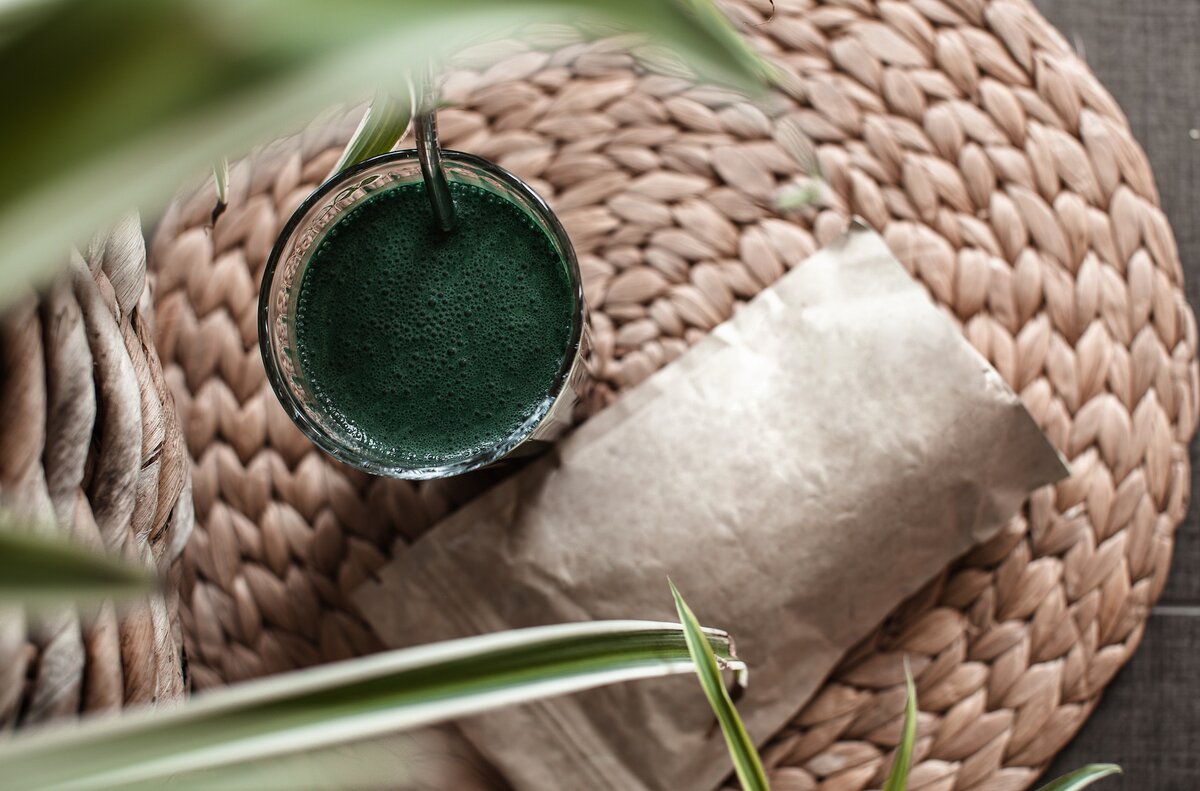As a nutrient powerhouse, spirulina is often spotlighted for its potential health benefits. Incorporating the right supplements like spirulina while breastfeeding can be a game-changer for both mother and child, given its nutritional importance. In this exploration of spirulina’s role in breastfeeding nutrition, we delve into how this blue-green algae might fit into a lactating mother’s diet, considering its dense nutritional profile and the unique demands of postnatal health. Join us as we unpack the intersection of spirulina’s benefits with the needs of breastfeeding, always through the lens of safety and wellbeing.
On this page:
What Is Spirulina? Understanding Its Nutritional Profile
Spirulina is a type of blue-green algae that grows in both fresh and saltwater. It’s recognized as a superfood because of its impressive nutrient content. This microscopic alga is packed with protein, making up about 60-70% of its dry weight. It’s a complete protein, which means it contains all the essential amino acids our bodies need but can’t produce on their own.
What’s more, spirulina is a rich source of vitamins and minerals. It boasts high levels of B vitamins, particularly vitamin B12, which is not typically found in plant foods. This makes it a nutrient of interest, especially for vegetarians and vegans. Spirulina is also abundant in iron, which is vital for maintaining energy levels and supporting the immune system. It provides a good dose of magnesium, potassium, and manganese as well.
This alga is also celebrated for its antioxidants, which help protect our cells from damage. It contains a powerful antioxidant called phycocyanin, which gives spirulina its unique blue-green color and may have anti-inflammatory properties.
Furthermore, spirulina is a source of other beneficial compounds like gamma-linolenic acid (GLA), a fatty acid that can promote a healthy heart. It’s also low in calories yet high in nutrients, which is why it’s often recommended as a supplement to boost nutritional intake without adding extra calories to your diet.
In short, spirulina’s nutritional profile is dense and diverse, and it stands out for its protein quality, vitamin and mineral richness, and potent antioxidant properties. It’s a natural, nutrient-packed option for individuals looking to supplement their diet with a powerful boost of healthful components.
The Benefits of Spirulina While Breastfeeding
Lactating mothers often search for ways to enhance their milk’s nutritional quality and their overall health. Spirulina, a nutrient-dense algae, can be a valuable addition to a breastfeeding mother’s diet. Packed with protein, spirulina provides essential amino acids vital for repairing tissues and supporting the immune system. For mothers, this means a potential boost in energy and improved recovery post-delivery.

Spirulina is also rich in iron, which is crucial during lactation to prevent anemia—a common postpartum concern. Its high iron content, paired with vitamin C, helps optimize iron absorption, offering a two-fold benefit. Moreover, spirulina contains essential fatty acids, including gamma-linolenic acid (GLA), which may support the development of an infant’s brain and eyes.
Breastfeeding mothers require extra nutrients to produce quality milk, and spirulina’s impressive range of B vitamins aids in energy production and the synthesis of important enzymes. Vitamins like B12, often a concern for those following a vegetarian or vegan diet, are present in spirulina, making it a good supplement for those with dietary restrictions.
The antioxidant properties of spirulina, attributed to compounds such as phycocyanin, can help combat oxidative stress, which is particularly relevant during the postpartum period. Oxidative stress can affect overall health, and reducing it is beneficial for both mother and baby.
Calcium, needed for bone health, is another nutrient found in spirulina. While breastfeeding, mothers can lose calcium from their bones, which spirulina can help replenish. This is especially critical for mothers who may not get enough calcium from their diet.
In sum, spirulina’s comprehensive nutritional makeup can support lactating mothers in multiple ways—from boosting energy levels and supporting immune function to aiding in the baby’s development and protecting maternal bone health. However, it’s crucial to consider purity and the source of spirulina to avoid potential contaminants that could harm mother and child.
Potential Concerns: Evaluating Spirulina Breastfeeding Safety
The primary worry stems from the fact that spirulina can be contaminated with heavy metals, such as lead, mercury, and arsenic, if not sourced from a reputable supplier. These toxins can harm an infant’s developing nervous system and brain.
Another point of caution is the presence of microcystins, toxins produced by certain algae that can be found in spirulina products that are not adequately controlled. Microcystins can cause liver damage and may pose additional risks to a breastfeeding infant, whose liver is still maturing.
Additionally, spirulina contains phenylalanine, an amino acid that could be problematic for babies with phenylketonuria (PKU), a rare genetic disorder that prevents the proper metabolism of phenylalanine. Infants with PKU require a special diet to avoid severe brain damage.
While spirulina is celebrated for its rich protein content, it’s also important to note that this protein includes all essential amino acids, which can be an issue for individuals with preexisting conditions that affect amino acid metabolism. This could inadvertently affect the milk composition for breastfeeding mothers.
Lastly, the immune-stimulating properties of spirulina may raise concerns, as there is limited research on how these effects could transfer through breast milk and impact the infant’s developing immune system.

Considering these potential concerns, it is crucial for spirulina breastfeeding mothers to consult healthcare providers before incorporating this supplement into their diet. Only high-quality, pure spirulina supplements with clear labeling and testing for contaminants should be considered, and even then, under the guidance of a health professional to ensure safety for both mother and baby.
How to Use Spirulina Safely: Guidelines for Breastfeeding Mothers
To ensure that you and your baby reap the benefits of this nutrient-packed superfood without any risks, follow these straightforward guidelines:
- Start with a Small Dose: If spirulina is new to your diet, begin with a smaller amount than recommended on the package. This might mean taking half a teaspoon and gradually increasing it over time.
- Choose High-Quality Spirulina: Not all spirulina is created equal. Opt for organic spirulina from a reputable brand that guarantees the product is free from contaminants such as heavy metals or harmful bacteria.
- Consult Your Healthcare Provider: Before adding spirulina to your diet, talk to your doctor or a dietitian. They can provide personalized advice considering your health history and nutritional needs.
- Watch for Allergic Reactions: Although rare, some individuals may be allergic to spirulina. Pay attention to how your body responds after consumption and look out for any unusual symptoms in both you and your baby.
- Keep Hydrated: Spirulina is high in protein and can be dehydrating. Drink plenty of water throughout the day to stay hydrated and support milk production.
- Monitor Your Baby’s Response: After introducing spirulina into your diet, observe your baby for any changes in behavior, digestion, or allergy signs. If you notice any negative reactions, discontinue use and consult with your pediatrician.
By adhering to these guidelines, breastfeeding mothers can enjoy spirulina as a part of a healthy diet while minimizing potential risks to themselves and their babies. Remember, moderation is essential, and your healthcare provider is your best resource for dietary decisions during this special time.
Addressing Common Myths and FAQs About Spirulina and Breastfeeding
As you explore the relationship between spirulina and breastfeeding, it’s important to separate fact from fiction. Here are some common myths and frequently asked questions about this nutrient-packed algae.
Myth 1: Spirulina increases milk production.
There's no scientific evidence to support the claim that spirulina boosts milk supply. While it's rich in nutrients, there's no direct link to increased lactation.
Myth 2: Spirulina can replace prenatal vitamins.
Though spirulina contains many vitamins and minerals, it doesn't have everything a breastfeeding mother needs. It should supplement, not replace, a well-rounded prenatal vitamin regimen.
FAQ 1: Is spirulina safe for all breastfeeding mothers?
Most mothers can safely consume spirulina; however, those with phenylketonuria (PKU), autoimmune issues, or allergies to seaweed should avoid it. Always consult your healthcare provider first.
FAQ 2: Can spirulina cause side effects in breastfeeding mothers or babies?
While rare, spirulina can cause side effects like nausea or an allergic reaction. Monitor both your and your baby's response, and seek medical advice if you notice unusual symptoms.
FAQ 3: How much spirulina is safe during breastfeeding?
Stick to recommended doses on product labels or as advised by your healthcare provider. Excessive intake hasn't been proven safe for nursing mothers or their infants.
While spirulina is a superfood, it’s not a miracle worker. Keep your expectations realistic and focus on a balanced diet for the best breastfeeding nutrition.
Beyond Spirulina: A Look at Other Beneficial Superfoods Post-Pregnancy
While spirulina certainly has its benefits for post-pregnancy nutrition, it’s not the only superfood that can offer support during this critical time. New moms considering spirulina while nursing have a variety of nutrient-rich options to ensure a healthy milk supply for their babies.
Chia seeds, for instance, are an excellent source of omega-3 fatty acids, which are essential for a baby’s brain development. Just a tablespoon sprinkled over oatmeal or blended into a smoothie can provide a significant nutrient boost. Plus, they’re high in fiber, which can help nursing mothers maintain a healthy digestive system.
Quinoa is another superfood powerhouse, packed with protein and all nine essential amino acids, making it a complete protein source. It’s also rich in iron and B-vitamins, which can help combat the fatigue many new mothers experience. Quinoa can be easily incorporated into meals as a rice substitute or tossed into salads for added texture.
Sweet potatoes are not only delicious but also full of vitamin A, which is important for both the mother’s and baby’s immune systems. They also offer a good amount of vitamin C, manganese, and copper, all of which are beneficial for recovering from childbirth and keeping energy levels stable.
Lastly, blueberries are a wonderful superfood for breastfeeding moms. They’re teeming with antioxidants, vitamins C and K, and fiber. These tiny but mighty fruits can help fight inflammation and boost heart health, which is especially important post-pregnancy.
Incorporating a variety of these superfoods into your diet can complement the intake of spirulina and help ensure that both you and your baby are getting a broad spectrum of nutrients for overall health and well-being.
Weighing Spirulina While Nursing Benefits and Drawbacks
Navigating the choice to include spirulina in your diet while breastfeeding involves weighing its rich nutritional benefits against safety considerations. Though spirulina is a powerhouse of essential vitamins and proteins that may support lactation, it’s crucial to prioritize purity and sourcing to avoid contaminants. Consulting with healthcare providers ensures spirulina supplements are integrated safely into postpartum nutrition. Remember, while spirulina can be a beneficial addition, it’s one part of a diverse, balanced diet that best supports the health of nursing mothers and their babies.


